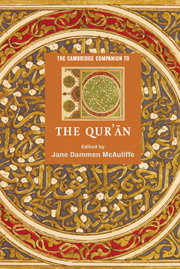Book contents
- Frontmatter
- Introduction
- Part I Formation of the Qur'ānic text
- 1 The historical context
- 2 Creation of a fixed text
- 3 Alternative accounts of the Qur'ān’s formation
- Part II Description and analysis
- Part III Transmission and dissemination
- Part IV Interpretations and intellectual traditions
- Part V Contemporary readings
- Qur'ān Citation Index
- General Index
2 - Creation of a fixed text
from Part I - Formation of the Qur'ānic text
Published online by Cambridge University Press: 28 March 2007
- Frontmatter
- Introduction
- Part I Formation of the Qur'ānic text
- 1 The historical context
- 2 Creation of a fixed text
- 3 Alternative accounts of the Qur'ān’s formation
- Part II Description and analysis
- Part III Transmission and dissemination
- Part IV Interpretations and intellectual traditions
- Part V Contemporary readings
- Qur'ān Citation Index
- General Index
Summary
In the Islamic representation, the Qur'ān is the scripture containing the revelations 'recited' by Muhammad and preserved in a fixed, written form. The majority view among Muslim authorities is that qur'ān, an Arabic verbal noun, comes from qara'a, 'to recite', 'to declaim', 'to read aloud'. Some Western scholars, however, think that it is derived from the Syriac qeryānā (reading, scripture, lectionary). That the origin of the word is not Arabic seems to be confirmed by the interpretation given by an ancient exegete of Jewish origin, Abū'Ubayda (d. 209/824-5), who understands what could have been the first revelation delivered by Muhammad: iqra'bi-smi rabbika (Q 96:1; which the majority of the exegetes understand as 'Read/recite: in the name of your lord'), as 'Proclaim/Call upon the name of your lord' (cf. Hebrew: qra bshem adonai; Syriac: qr'ā b-shem māryā).
THE S TATUS OF THE QUR’Ā N DURING MUḤAMMAD’S LIFETIME
The Qur’ān and Muḥammad’s prophetic experience are very closely linked. Often the text responds explicitly to Muḥammad’s historical situation and even sometimes to his domestic problems. The Muslim theological position is that God is the speaker throughout the Qur’ān, Muḥammad the recipient, and the angel Gabriel the intermediary agent of the qur’ānic revelations. But in what seem to be the oldest parts of the Qur’ān, the speaker and the sources of revelation are not mentioned (Q 91:1–10); in some passages there is no indication referring to a deity as a source of the message (Q 103:1–3) and in others Muḥammad seems to be the speaker (Q 81:15–21).
- Type
- Chapter
- Information
- The Cambridge Companion to the Qur'ān , pp. 41 - 58Publisher: Cambridge University PressPrint publication year: 2006
- 6
- Cited by



